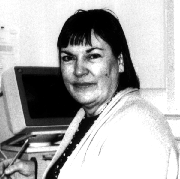 by Joan P. Schwartz, Ph.D., NINDS
by Joan P. Schwartz, Ph.D., NINDSIn the cool, abstract atmosphere of ethics training classes, it can seem easy to discern proper conduct, especially when it comes to what other people should do. But in the real world -- right now, right here, among our colleagues, even in our own labs -- the issues become blurred. For example, the decision to "call" someone on their science -- to say that you cannot repeat the experiments -- always comes at a price and rarely earns one plaudits or pay raises. The price may be lost time, the resentment of colleagues, or even castigation as a troublemaker. If the error in the literature is inconsequential for human health or advancement of the field, a paper correcting the mistake may not get published -- even though we may all agree that such a correction should be made in the best of all possible worlds. This was the situation facing a young scientist as a postdoc at an academic institution before she came to NIH. What follows is her account. I urge you to put yourself in her place -- and in the place of her adviser -- and consider what you would have done.
While working as a postdoctoral fellow, I started a research project that built upon results of experiments done by a former postdoc in the laboratory. Although I followed the methods exactly as described by the postdoc, my results were at odds with his previously published data. There was little question about the techniques involved because they were quite simple and widely used in the lab. What's more, I repeated the experiment a second time and again found my results at variance with the previous work. When I reported my results to my supervisor, I was met with apparent indifference. I was encouraged to move on to another project, which I did.
The upshot was that I wasted about six months on the project. Although I was running concurrent experiments, this particular project accounted for most of my time. I wasn't the only person in the lab who failed to replicate results collected by the particular postdoc. I didn't think that the trainee had intentionally misled anyone. I saw this not as misconduct but as "borderline science" -- work that is not intentionally deceptive, but that through failure to follow rigorous scientific methodology results in misrepresentation of the facts. My impression was that the postdoc whose work I could not replicate believed in the results but had poor analytical skills and simply failed to recognize the weakness of the findings.
My supervisor was clearly not interested in co-authoring a report of my data, which would have been the norm for data collected in this lab. Perhaps I could have corrected the scientific record by publishing on my own, although I seriously doubted that reviewers would have accepted my contradictory results. The published paper had virtually no implications for human health and the work occupied a specialized niche that was dominated by the lab in which I worked. Thus, it was extremely unlikely that anyone outside that particular lab would have tried to replicate the published data.
Had I been confronted with a situation in which the breach of ethics was both clear and consequential, I would have attempted to pursue the matter further. However, I didn't view it in that light. Although the apparently honest mistake wasn't fully rectified in the literature, it was self-correcting in the sense that, eventually, that line of research was discontinued.
This young postdoc was clearly dependent on her adviser for success in publishing, getting recommendations, and ultimately, launching her scientific career. All this might have been jeopardized had she insisted that her supervisor acknowledge that his earlier postdoc was a poor scientist and, by implication, poorly trained. One particularly distressing consequence of this episode was that it left the postdoc somewhat cynical.
At NIH, I would expect that our supervising scientists would have taken a course different from the laissez-faire approach of the postdoc's supervisor. Acknowledging that work cannot be repeated -- even, or especially, when it is work from our own lab -- should not be a big deal. After all, it's central to the self-correcting nature of the scientific process and is in no way tantamount to an allegation of misconduct. Failing to correct errors may compound the problem many times over if others end up wasting time and resources, and if it fosters undue cynicism among our next generation of researchers.
But I suspect that similar incidents occur all the time. Few scientists would go out of their way, investing precious time, money, and personnel, to correct a suspected error in a colleague's work if the research appeared to be largely unimportant. This choice is part of stewardship. But if the line of research has a chance of leading somewhere (and who can really know this in advance?), and if some investment has been made that provides tentative data indicating an error in the literature, we enter a gray area. How important should the research be? How much effort should we invest? What if our correcting paper is rejected? Clearly, the obligation to correct our own mistakes and those of our students is compelling. But what about the errors of a fellow postdoc or a more senior staffer in our lab?
We want to make this forum a place for frank discussion among NIH scientists, and we welcome all comments on these questions and on what you see as the best course of action in the incident described above. In a future issue,we will publish your responses. Please send your comments to The NIH Catalyst (fax: 402-4303) or to me (e-mail: joan_schwartz%nihod1e @cu.nih.gov).